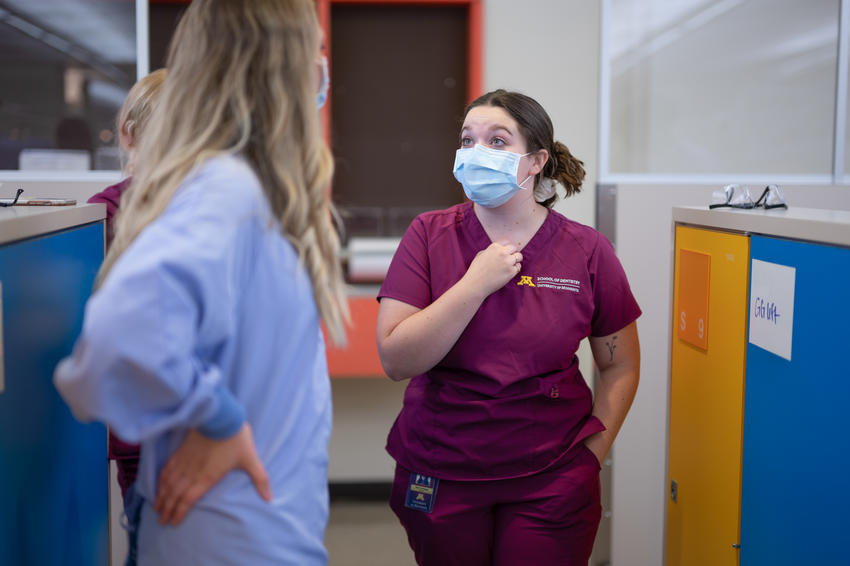New grant program makes dental hygiene part of hospital care

Cyndee Stull, DHSc, director of the Division of Dental Hygiene, takes the connection between oral and systemic health seriously. That connection informs everything she does, and it’s the inspiration behind a project being funded by Delta Dental of Minnesota Foundation.
Stull’s research and teaching have long focused on the role of oral health in systemic diseases. While teaching courses to that effect, she discovered how oral health care can decline significantly after only a few days of hospitalization, and how that can impact patient outcomes. As she realized how much there was for her and her students to learn, she connected with a medical school colleague who had similar interests, and a desire for his students to learn more about oral health.
In 2016, Stull and her colleague created a new hospital rounding experience: dental hygiene students partnered with third-year medical students to become part of the patient rounding experience. “The goals were to expose both student groups to the oral/systemic connection and to interprofessional collaboration,” Stull explained. “Since then, our students round with medical teams all three semesters of their senior year, accompanied by a dental hygiene faculty.”
The experience was so successful and uncovered such a need for oral health education and advocacy in the hospital system that Stull sought to further institutionalize the experience. In 2019, a grant from the Office of Academic Clinical Affairs allowed Stull and Keeley Flavin, BSDH ’16, MSDH ’21, to implement a dental hygiene consult service in the hospital. For 20 hours per week, Stull and Flavin triaged patients, performed oral assessments and worked with our General Practice Residency team. “It was very successful,” Stull reflected, “but we need more data and more experience to explore the long-term sustainability of a hospital dental hygiene consult service.”
Stull has high hopes for a more institutionalized, long-term consult service. “We know that good oral health impacts the outcomes of hospitalized patients, but often oral care during a hospital stay is not prioritized. Nurses have a lot on their plate, and physicians and nurses get very little training on the mouth,” she explained “We suspect that we will be able to reduce the time to diagnosis for some patients, reduce the length of stay for others and improve patient outcomes.” Having a dental hygienist in the hospital will allow for quicker consultation with the hospital dental service, a reduced burden on nurses and more informed systemic care, Stull predicts—but she needs more information.
That’s where Delta Dental of Minnesota Foundation comes in: “I knew that Delta Dental of Minnesota Foundation is focused on improving the oral health of Minnesotans, and they understand the role of oral health in overall health,” Stull said. So, with the help of Emily Best, SOD Chief Development Officer, the University of Minnesota Foundation applied for grant funding to further her studies. “It seemed like a great partnership to advance our shared oral and overall health goals.”
Delta Dental of Minnesota Foundation approved a grant to develop a full-time dental hygiene consult service, implement a quality improvement plan and evaluate the impact of the hygienist in a hospital setting. The grant will fund an estimated 5,200 patients’ assessments and services over the next two years.
Stull was ecstatic to hear of the grant’s approval. “I can hardly sleep at night!,” she said. “There is so much potential for the role of a dental hygienist in the hospital that we haven’t yet been able to address.”
And since the grant’s announcement, she has already seen its potential in action: services across the hospital have reached out to share their interest in working together, and Stull can’t wait to solidify and deepen her relationships. With a full-time dental hygienist in the hospital, Stull hopes she and her team can work with teams across the hospital to improve patient care, independence in oral care, nutrition and quality of life, among other needs. She is excited to reduce the burden of oral health care on nurses while also providing better community resources to patients as they leave.
“We hope to show the value of a dental hygienist as a member of the hospital team in improving patient outcomes through shorter time to diagnosis of conditions of unknown origin, reduced length of hospital stays, improved collaboration between dentistry and other healthcare professions in the hospital and improved awareness of oral health by other members of the healthcare team,” she said. “It all boils down to improving the health of our community and reducing the costs of care through early detection and prevention of oral health problems that impact oral health.”
And above all, the experience is one more way Stull is proclaiming to the world what she believes most deeply: “The mouth should not be considered separate from the body. We must consider the impact of oral health on overall health, and vice versa.”
